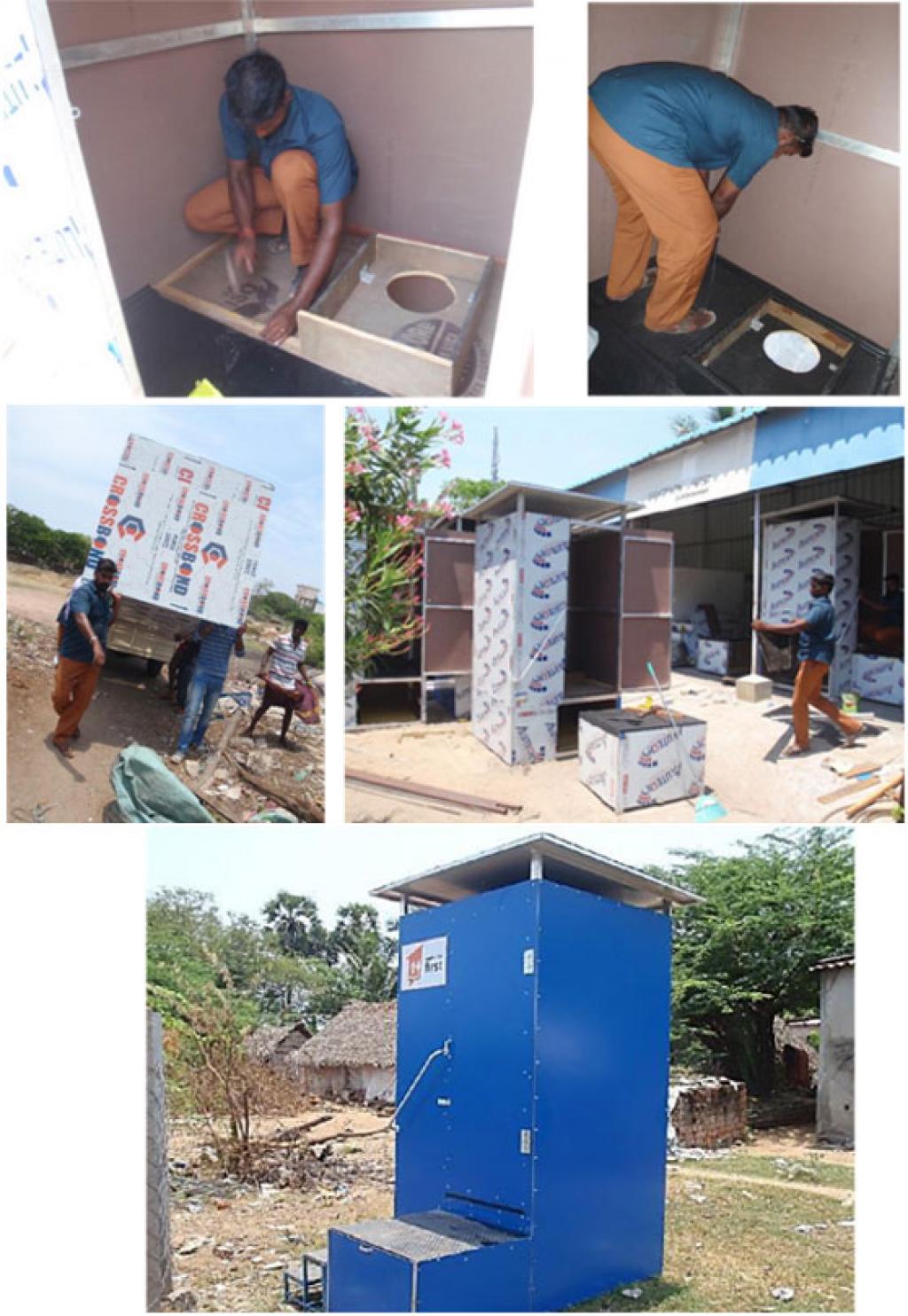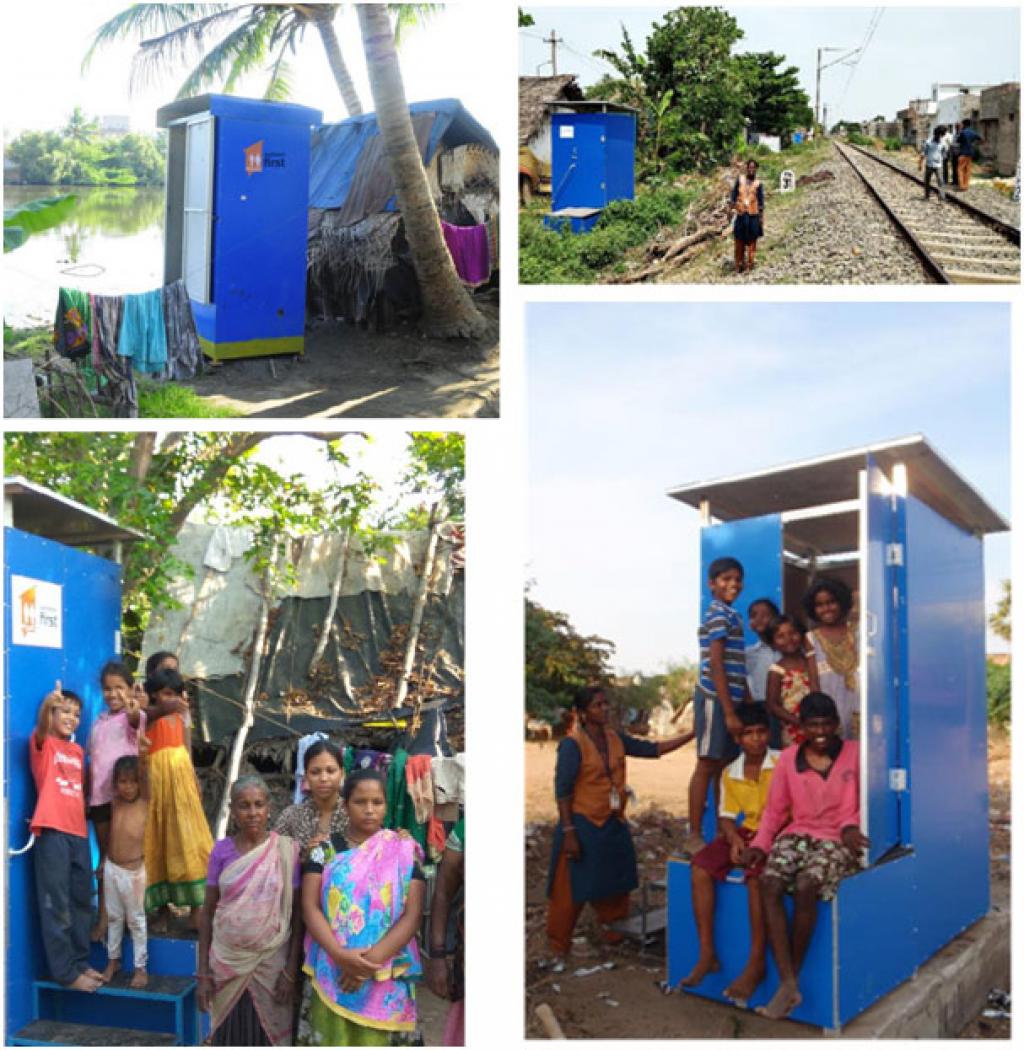GroSan Toilet
| Capacity | Designed – 45 members Actual – May vary according to the size of the community | Area of installation (Sq. ft.) | 24 |
| Inlet | Excreta + Urine | Outlet | GroComp (Compost), Liquid Gold (Liquid Fertilizer) |
| Year of Installation | Since 2009 | Capital investment (INR) | Rs. 83,000 / 45 users |
| Scale of service | 150 toilet units | Treatment time | 150 - 180 days |
Location of the technology:
Cuddalore, Tamil Nadu & Puducherry (UT)
Need for technology
The need for this technology is in those settlements where the following issues are observed:-
- No space for individual toilets
- Public toilets are far away
- Access to disable and old age is difficult
- Civil encroachments
- Alarming depletion of water resources
- Increased water contamination and pollution of the environment
- Last mile coverage in OD prone public spaces, infrastructure and logistics constrained areas
The technology has the potential to convert waste into usable resources
Treatment Principle:
- EcoSan Technology (Urine Diverting Dry toilet)
- Four heavy-duty containers (90kgs each) are placed on a roller underneath the toilet to collect solid waste
- Separate cans to collect the urine & wash water
- Faeces are covered with one of these cover materials - ash/sawdust/dry soil
- Water is used only for self-cleaning
- Each container gets filled between 8-10 days depending upon the number of users.
- The filled containers are safely transported to a secure compound
- The containers are stored for 120-150days after which they are processed into pathogen-free compost
- Neem cakes and coco peat are added to the compost to make it nutrient rich
- Operates as per WHO Sanitation Safety Plan
- Compliant with Prevention of Manual Scavenging Act
System description
Installation of Grosan Toilets: Sanitation-First has developed a UDDT (urine diverting dry toilet) with Semi-permanent superstructure for decentralised sanitation solution called the GroSan toilet. The toilet system is based on ecological sanitation (EcoSan) technology, designed to transform human waste into useful and safe manure or soil conditioner. EcoSan offers a very realistic alternative as a sustainable, long-term solution in terms of space and infrastructure restricted slum environments. This technology is waterless, energy-free, and easily scalable and replicable. GroSan toilets are portable, semi-permanent units.
The Functioning of GroSan toilets: The GroSan pans are made of ceramic material and the toilet operates on a container-based model. Four heavy-duty containers are placed below the squatting pan, each with a capacity of 90kg to collect faecal matter. Each container will fill up in 6 to 8 days, dependent on the number of users, each unit produces approximately 108kg of faecal compost and 300 litres of urine per month. The users of the toilet cover the faeces with ash or similar cover material, such as sawdust, or dry soil, to quicken the dehydration process and protect against flies (insects carry faecal particles and transmit harmful pathogens). Once the first container is filled, it is moved and the next empty container is placed. Likewise, when the fourth container is filled, the first one is 25 to 32 days old and dry. Fresh faecal matter is never handled in this process. Containers are regularly and safely collected before being transported to a secure compound. The containers are then stored in the compound for a further 120 – 150 days to make the compost pathogen-free and safe to use as a plant fertilizer.
Collection Services: Sanitation-First provides collection services to ensure regular replacement of containers. The service team collects filled containers and urine cans and tops up the carbon-based material used to cover defecation. They also check and report back any issues with the GroSan units. These service operatives are ideally placed to be able to understand the community’s utilisation and feedback. The collection of waste and maintenance of GroSan toilets is free of charge to service-users.
Resource Recovery and Monetisation
The collected waste is delivered to a processing compound where it is converted into GroComp compost – a safe product developed to enhance agricultural productivity. This is a valuable soil enricher and conditioner. Sanitation First has developed a highly effective, enriched compost fertilizer combining a mix of humanure with nutrients such as neem cakes, and farmyard manure – ideal for a range of crops including flowers and vegetables. This compost is then sold at a competitive price to farmers, thereby providing revenue to cover the running costs.
Operation and maintenance:
| Maintenance of the installation O&M cost (INR) | Rs.100/month/unit |
| Electricity consumed (In units) | NA |
Social aspect
Perspective towards the technology/plant:
| Pros | Cons | |
| ✓ | Easy to install | ✓ Requires attitudinal change and behavioural change |
| ✓ | Requires less space | |
| ✓ | Waste is converted into usable agricultural inputs | ✓ Sometimes poses a conflict between neighbours as it is a shared toilet |
| ✓ | No leaching & prevents contamination of water sources | |
| ✓ | Water conservation | |
| ✓ | Low maintenance and recovery cost | |
| ✓ | Reduces per capita water use for toilets |
Fabrication & Installation of GroSan

Grosan placed in different locations & used by the communities

Collection, transportation and processing of compost

Contact details:-
109 M, 2nd Floor
Jaya Vilas Complex
Cuddalore Road
Mudaliarpet Puducherry 605 004
PH# +91 413 235 4428


Share this article